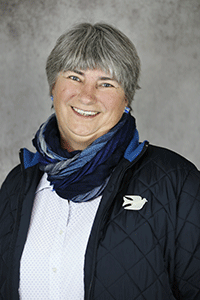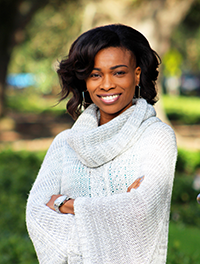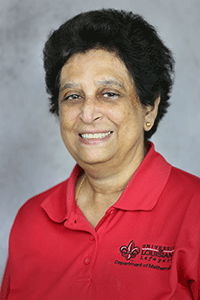Professors Making a Difference
Meet three UL Lafayette graduate professors who are making a difference in people’s lives — in the classroom, in their professions, and across the state. They are scholars and mentors, dedicating their lives to research and teaching while working to make their fields more inclusive.
 Jenneke Visser, School of Geosciences
Jenneke Visser, School of Geosciences
School of Geosciences professor Jenneke Visser recently won the international Changing Course design competition with a team of engineers, coastal ecologists, architects, and geologists for their work on Louisiana’s vulnerable coastline.
Dr. Visser has spent her career researching coastlines and wetland plant ecology, and has been teaching at UL Lafayette since 2008. Preserving and restoring Louisiana’s coastline is imperative when it comes to protecting the communities and wildlife along the Gulf of Mexico. The marshes and coastal systems along the Gulf reduce storm surge and help prevent flooding during storms, improve water quality, and are home to historical, hunting, and fishing sites.
“Louisiana’s coastline really supports the local economy as well as the national economy. Louisiana fisheries are the second highest fisheries after Alaska, and then there is all of the commercial activity on the Mississippi River,” she says. “If we don’t take action, we lose our coastline and we’ll have a coast close to Baton Rouge.” As a result, the importance of Dr. Visser’s research can’t be overstated.
Dr. Visser and her team, with whom she recently won the international Changing Course design competition, designed a plan based on a 100-year projection and determined that Louisiana has to focus on sustaining and building up existing marshes first. To accomplish that, a system to divert sediment should be located higher upstream in the Mississippi River, sending sediment to existing marshes instead of using it to build new marshes.
Dr. Visser also works with graduate students on wetland plant ecology research and helps guide their thesis projects, along with involving undergraduates in research projects. Currently, she is working with the Department of Biology graduate faculty and students to model and predict how changes in water salinity and level affect plants. Her team is working to forecast how plant communities change over time as hydrology changes, research that is helping to shape the Louisiana Coastal Master Plan.
And for Dr. Visser’s students, the coastline is their classroom:
“I really like to take them out there so they can experience the beauty of the coast as well as its bounty,” she says. “I take them out on an overnight field trip, and we go crabbing so they can really get to see the productivity of the system. That’s the fun part, but I also like to make them more informed citizens with respect to global sea level rise and the pros and cons of various coastal restoration methods. They generally love the field trips, of course, but they become more informed citizens and hopefully a few of them will find it interesting enough to choose coastal restoration as a career path.”
Read more about Dr. Visser’s award-winning work.
Kiwana McClung, School of Architecture & Design
School of Architecture and Design assistant professor Kiwana McClung is helping minority architecture students carve out their place in their profession. This year, she was awarded the Association of Collegiate Schools of Architecture Diversity Achievement Award for her work in creating models for greater diversity to the architecture curricula, personnel, and student body.
“I was once a minority student myself, so I understand the issues and hurdles that minority students face in schools of architecture,” she says. “I feel strongly that we need to diversify the architecture profession in order to better serve the different cultures and ethnicities that make up our population. This means that schools of architecture become ground-zero for diversity and inclusion efforts. The recruitment, retention and graduation of minority architecture students is crucial to diversifying schools of architecture.”
Her approach to including more students from different backgrounds includes a school-wide effort to recruit, provide scholarship opportunities, advise, mentor, and lead service activities. As the faculty advisor for UL Lafayette’s chapter of the National Organization of Minority Architecture Students, she works directly with students on community projects, competitions, and mentoring and advising underclassmen. NOMAS has quickly become one of the most active student organizations in the School of Architecture and Design. In their weekly meetings, Professor McClung encourages students to discuss the issues they face as minorities.
“I put a significant amount of effort into understanding the social dynamics and factors that can cause minority students to discontinue their architectural studies,” she says. Those can include lack of funding to cover studio supplies and printing costs, lack of understanding from family and friends, and a studio culture that doesn’t embrace diversity.”
“Another big thing that hits hard is when architecture curriculum fails to address the architectural contributions of women and ethnic minorities—how can you retain the desire to become and architect when none of the architects you learn about in school look/live like you?” she asks. “Teaching methods in schools of architecture should consider the ideas, cultures, and experiences of minorities. I combat these issues by mentoring minority students, by looking for ways to help students acquire more funds for school, arranging opportunities for undergraduate research that focuses on minority contributions in architecture, and helping plan more inclusive curricula and teaching methods.”
Professor McClung says she is honored to receive the 2016 ACSA Diversity Achievement Award, and hopes that other schools can incorporate an approach similar to hers.
“The architecture profession in the United States would be much more dynamic as a whole if it were more diverse in its practitioners bringing new and fresh ideas to the profession that could compete the world over,” she says. “Moreover, I think that our success in improving the educational experience of minority architecture students, in addition to the various diversity initiatives being implemented across campus, sets up UL Lafayette as a preferred destination for minorities interested in studying architecture in southern Louisiana.”
Read more about Kiwana McClung.
Aghala Vatsala, Department of Mathematics
Dr. Aghala Vatsala has had her dream job for 30 years: teaching mathematics and doing research at UL Lafayette. As a member of the graduate faculty in the Department of Mathematics, she has directed 12 Ph.D. students — who she says are like her “academic children.”
“My math Ph.D. students become part of my extended family,” she says. “I do care for them as my own children. One of my students coined the word, and referred to me as his ‘academic mom.’ I enjoy their successes and triumphs.”
Dr. Vatsala acknowledges that she, as a woman, is a minority in a male-dominated field, but she credits her upbringing with helping her forge her path in the sciences—and wants her female students to do the same. Dr. Vatsala says she is proud that half of her Ph.D. students are female.
“I grew up with the confidence that anything my brothers can do, I can do it, too,” she says. “This is what I tell my female students: that diligent and hard work with proper planning will help you succeed in your career and life. It is not easy but doable.”
From 2011-2014, Dr. Vatsala worked on a National Science Foundation grant called Smooth Transition to Advancing Graduate Studies (STAGE), a summer program on UL Lafayette’s campus for women and underrepresented minorities majoring in STEM areas. The program helped train these students so they were prepared to enter a graduate program, including in math. The program was so successful that they plan to have it again.
Dr. Vatsala has published three research monographs and more than 150 peer-reviewed research articles, and obtained grants from a range of agencies. She credits her family, friends, mentors and teachers for helping her find professional success, and she wants to be part of that support system for her students. That starts at the undergraduate level, helping students build a strong foundation that makes learning math easier and more exciting. Then, at the graduate level, that translates into independent research.
“Conducting research is basically a creative idea being executed,” she says. “I just try to convey to my students that research in mathematics is fun and exciting. It is not just routine memorization, as some people think. Now I know that idea has become contagious. It gives me immense pleasure to hear that some of my academic children are already great teachers and mentors for their students.”